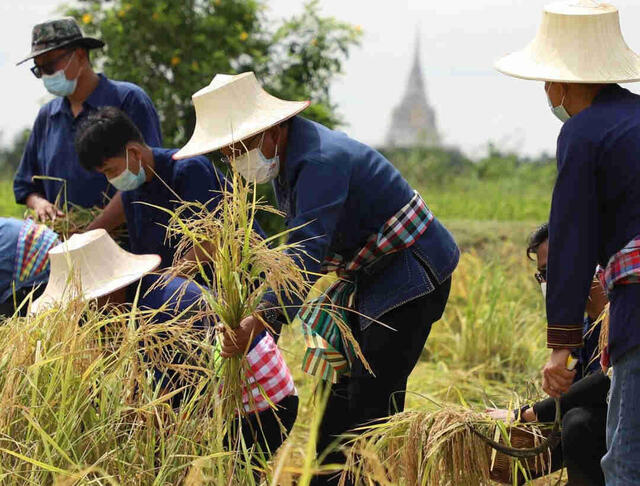เก็บเกี่ยว คัด คุ้ยเขี่ย เฟ้น เสาะแสวง
เก็บเกี่ยว คัด คุ้ยเขี่ย เฟ้น เสาะแสวง
(ภาษา และ ความรู้)
I read a lot and sometimes read carefully paying more than usual attentions to words and sentences. Why? Because I use reading as a means of learning. If I read quickly I can miss a lot of things or misunderstand many things. I am showing my note on this process in hope that it would spur up many thoughts and ideas.
But before reading my note, I would like to explain my ‘philosophy’ on experiential learning.
Learning is building ‘a memory’ that we can recall and use at later time. The memory may be of ‘real events’ that have actually occurred. The memory may be of ‘imagining’ or thinking that have a logical or abstract result but not actually happened. Now, what is 'real'? Is it something we can touch with ‘our senses’ (eyes,ears,…)? Is a picture real? Is what in the picture real? We don't hear the picture nor the series of pictures (in a movie). So, we have a lot to think about ‘real’ and ‘senses’. Imagining also has issues to think about. Because Imagining gets tested for ‘our admission’ (and rejection) based on the ‘our whole experience’ that we can recall at the time. We may think of ‘real’ as ‘historic’ and ‘imagining’ as ‘future’. We are at the present linking and adjusting the past and the future to make ‘memory’ (of the experience).
This concept of learning applies well to many forms of experiences (even pains and pleasures). But to apply to ‘teaching’ (as intentional process for learners to learn) is not easy. How can we create ‘the’ experiences required by every learner (individually, not as a one experience for 'all').
Are we ready to read the note?
(*if your are one of typical Thai readers, you don't see this or below.* ;-)

เก็บเกี่ยว ก. เก็บรวบรวมพืชผลจากที่ได้หว่านหรือลงไว้.
--harvest n 1: the yield from plants in a single growing season [syn: {crop}]
2: the consequence of an effort or activity; "they gathered a harvest of examples"; "a harvest of love"
3: the gathering of a ripened crop [syn: {harvesting}, {harvest home}]
4: the season for gathering crops [syn: {harvest time}]
v : gather, as of as crops [syn: {reap}, {glean}]
--reap v 1: gather, as of as crops [syn: {harvest}, {glean}] VT. ได้รับ/เอา ผลตอบแทน
2: get or derive; "He drew great benefits from his membership in the association" [syn: {draw}]
--glean v : gather, as of as crops [syn: {reap}, {harvest}]
VI. รวบรวมข้อมูล relate:[เก็บตกข้อมูล] syn:[distill; extract]
VT. เก็บรวงข้าวที่ร่วงหล่น syn:[collect; gather]
VT. รวบรวม relate:[ผสมผสาน] syn:[collect; gather]
*เก็บเกี่ยว* has a sense of intentional/planned/predefined investment/return
*glean* has a sense of search for certain/conceived valuable/items from a field of sundry/multitudes
--scan n : the act of scanning; systematic examination of a prescribed region; "he made a thorough scan of the beach with his binoculars"
v 1: examine minutely or intensely
2: examine hastily [syn: {skim}, {rake}, {glance over}, {run down}]
3: glance over or read superficially
4: make a wide, sweeping search of; "The beams scanned the night sky"
5: conform to a metrical pattern; of poetic verse
6: move a light beam over; in electronics, to reproduce an image
7: read metrically; "scan verses"
8: obtain data from magnetic tapes; "This dictionary can be read by the computer" [syn: {read}]
VT. ตรวจรายละเอียด relate:[ตรวจตรา, ตรวจสอบ, ตรวจดูอย่างละเอียด] syn:[examine; investigate]
VT. อ่านผ่านๆ relate:[อ่านลวกๆ , อ่านเร็วๆ, ดูอย่างผิวเผิน] syn:[browse]
VT. วิเคราะห์เสียงสัมผัสของบทกวี
VT. กวาดภาพ relate:[ปรากฏภาพ]
N. การกวาดภาพ (จอโทรทัศน์) relate:[การกวาดสัญญาณ]
*scan* (as a commonly used verb) has a sense of 'examine minutely or intensely' (ตรวจรายละเอียด)
เสาะแสวง ก. ใช้ความพยายามมากเพื่อค้นหา เช่น ของชิ้นนี้เป็นของหายาก เขาอุตส่าห์ไปเสาะแสวงมาให้.
เสาะ ๑ ก. ค้น, สืบ, แสวง, เช่น เสาะหา.; ว. ไม่เข้มแข็ง ในคำว่า ใจเสาะ.
๒ (โบ; วรรณ) ก. ทรุดลง, ห่อเหี่ยวลง, ใช้ว่า เสราะ ก็มี เช่น ก็เสาะและเสราะใจจง. (สมุทรโฆษ). (เทียบ ข. โสะ = จืด, ชืด, ขาดรสชาติ, หมด).
*เสาะหา* not listed in Royal Institute Dictionary 2542BE (Th-Th)
แสวง [สะแหฺวง] ก. เที่ยวหา, ค้นหา, เสาะหา. (ข.).
==เฟ้น ๑ ก. คัดเอาแต่ที่ดี, คัดเอาแต่ที่ต้องการ, เลือกเฟ้น ก็ว่า.
๒ ก. บีบนวด, นวดเฟ้น ก็ว่า.
==คัด ๑ ก. เลือก, แยกสิ่งที่รวมกันอยู่, เช่น คัดออก คัดเอาไว้, งัดให้เผยอหรือเคลื่อนที่ เช่น คัดไม้ซุง, ใช้พายหรือแจวงัดน้ำออกจากตัว, ตรงข้ามกับ วาดเรือ; ลอกข้อความหรือลวดลายออกมาจากต้นฉบับ เช่น เอาหนังสือนี้ไปคัด. (อะหม คัด ว่า แยก, ทำให้แยก).
๒ ว. แน่นหรือตึง เช่น จมูกคัด นมคัด.
๓ ก. เขียนด้วยตัวบรรจง เช่น เขียนเร็ว ๆ อย่ามัวแต่คัด.
==ขุด ก. กิริยาที่สับ เจาะ แทง หรือ คุ้ยเอาดินหรือสิ่งที่อยู่ในดินขึ้น เช่น ขุดดิน ขุดศพ, อาการที่ขุดดินหรือสิ่งใดสิ่งหนึ่งให้มีรูปร่างตามที่ต้องการ เช่น ขุดหลุม; เรียกเรือชนิดที่ทำด้วยไม้ซุงทั้งต้นหรือทั้งท่อน ขุดด้านบนให้เป็นรางแล้วเบิกปากออกให้กว้าง ถากหัวและท้ายเรือให้เรียวเชิดขึ้นตามส่วน ว่า เรือขุด; โดยปริยายหมายถึงอาการที่คล้ายคลึงเช่นนั้น เช่น ขุดเรื่องเก่า ๆ ขึ้นมาพูด, ขุดคุ้ย หรือ คุ้ยเขี่ย ก็ว่า.
--ขุดคุ้ย ก. ค้นเอาเรื่องเก่าขึ้นมาเปิดเผย, ขุด หรือ คุ้ยเขี่ย ก็ว่า.
--คุ้ยเขี่ย ก. ค้นเอาเรื่องเก่าขึ้นมาเปิดเผย เช่น เรื่องนี้อย่าไปคุ้ยเขี่ยขึ้นมาเลย, ขุด หรือ ขุดคุ้ย ก็ว่า.
*คุ้ยเขี่ย* when used with animals (chickens, birds) has a sense of looking for food
==scavenge
v 1: clean refuse from; "Scavenge a street"
2: collect discarded or refused material;
"She scavenged the garbage cans for food" [syn: {salvage}]
3: feed on carrion or refuse; of some animals
4: remove unwanted substances from, as in chemistry [syn: {clean}]
VI. ค้นหาของ (ที่ยังใช้ได้) จากกองขยะ relate:[รวบรวมสิ่งที่ยังใช้ได้ออกจากกองขยะ] syn:[search; seek]
VT. ค้นหาของ (ที่ยังใช้ได้) จากกองขยะ relate:[รวบรวมสิ่งที่ยังใช้ได้ออกจากกองขยะ]
VI. เอาสิ่งสกปรกออก relate:[ทำความสะอาด, กวาดขยะ, ขนขยะ]
*scavenger* one who makes [scours] a living from a rubbish dump [landfill];
--Children and digital dumpsites: Smaller hands, cheaper labour - the crisis of e-waste and children´s health 15 June 2021 https://www.who.int/news-room/questions-and-answers/item/children-and-digital-dumpsites-e-waste-and-health
ความเห็น (0)
ไม่มีความเห็น